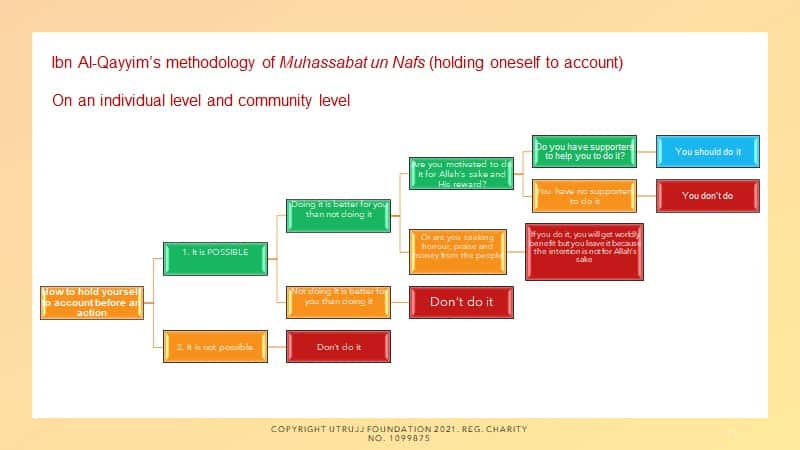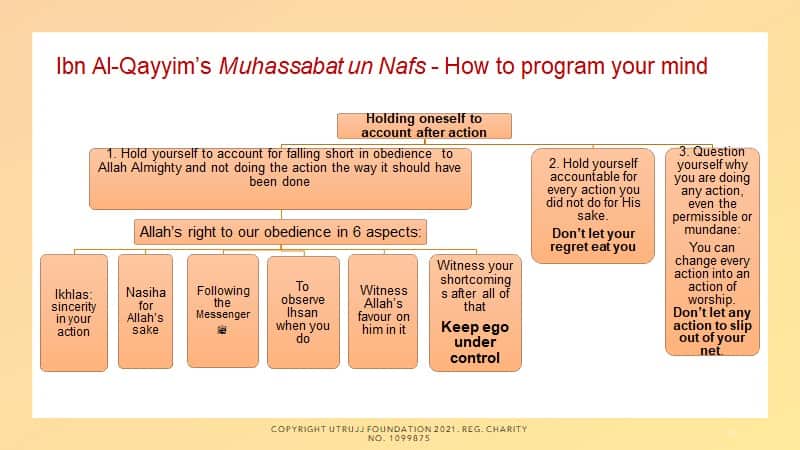How to make a decision

If you are undertaking a project or making a decision many factors come into your mind. What is the best way to decide if doing an action is the right thing to do or not?
Ibn Qayyim
This model is based on Ibn Qayyim’s methodology in his book Ighathatu al Lahfan. It gives us a program which checks in place to ensure we approach any action while holding our self to account. This ensures that our actions keep the soundness of our heart in mind.
Muhasaba (self-audit)
To hold yourself to account, is called muhasaba in Arabic. Muhasaba literally means accountancy literally. Hence, Yaumul hisab is the day of accountancy or the day of reckoning. This method helps you hold yourself to account before you are accountable in the akhirah.
This is the summary. Before you embark on something ask yourself four questions:
1. Is it possible?
First ask yourself ‘Is it possible to do this action or not?’ If it is possible then you can move forward, if not then you cannot do it.
2. Is it beneficial?
If it is possible, you move on to the second question. Ask yourself ‘Will doing this action be better for me than not doing it?’ The focus is on the benefit. Not whether you like it. If it is not better for you to do it, then drop it. Moreover, if doing this will cause harm, then do not proceed with it.
3. What is your motive?
If doing the action is better for you, then you pose the third question. Ask yourself why you are doing it. What is the motive behind your action, which we call the niyat (intention). Is it for Allah Almighty’s sake and seeking His reward or something else? If it is for the sake of Allah Almighty, then proceed with the right etiquettes, and in the way that complies with the sunnah.

4. Do you have support?
Lastly, you can assess the level of support you have to do an action or project or start an initiative at a group, team or community level.
At community level
This chart can also be used not just at an individual level, but at a group, team, or community level. ‘Do you have supporters to achieve this action or not?’
Ibn Qayyim mentions here the story of the Prophet (peace be upon him) in Makkah and Madinah. In Makkah, he wanted to do much, but he had very limited support, so he could not establish a whole city based on the revelation. By contrast, in Madinah he had supporters so he moved forward. The plans, which he postponed in Makkah, he could apply in Madinah. This is why he has these two different categories like individual and the community level.
This is a useful method. We can reprogram our mind to follow this sequence. When you do something ask yourself these questions: Is it possible, not possible? Beneficial or not? Why am I doing it? Is it for Allah’s sake or for likes and followers? Or praise? The more you train yourself, the more it will become second nature insha’Allah ta’ala.
After the action
Once you have done the action, you need to assess yourself again. The chances are that you made plenty of mistakes. In order to fix them, what do you do? Hold yourself to account for your own actions. If it was an obligation you had to fulfil, did you do it in the right manner or did you fall short in fulfilling Allah Almighty’s rights.

Did you fulfil the rights of Allah?
Ibn Qayyim divided Allah Almighty rights to our obedience in 6 aspects. I’m keen to share this with you because it’s very useful to keep in mind and to apply.
- Ikhlas
Number one if you are doing an act of worship or anything for Allah Almighty’s sake, it has to be with ikhlas, sincerity. This takes us back to the very famous hadith
إنَّمَا الْأَعْمَالُ بِالنِّيَّاتِ
Actions are based on intention. (Bukhari and Muslim)
Ikhlas (sincerity) in your intention for Allah’s sake is vital.
- Nasiha
The second thing is to give the sincere advice (nasiha) for Allah Almighty’s sake. Our whole religion is about giving the right advice.
Tamim ibn Aus ad-Daree (may Allah be pleased with him) narrated that the Prophet (ﷺ) said الدِّينُ النَّصِيحَةُ:
عَنْ أَبِي رُقَيَّةَ تَمِيمِ بْنِ أَوْسٍ الدَّارِيِّ رَضِيَ اللهُ عَنْهُ أَنَّ النَّبِيَّ صلى الله عليه وسلم قَالَ: “الدِّينُ النَّصِيحَةُ.” قُلْنَا: لِمَنْ؟ قَالَ: “لِلَّهِ، وَلِكِتَابِهِ، وَلِرَسُولِهِ، وَلِأَئِمَّةِ الْمُسْلِمِينَ وَعَامَّتِهِمْ.” [رَوَاهُ مُسْلِمٌ]
“The deen (religion) is nasihah (advice, sincerity).”
We said, “To whom?” He said, “To Allah, His Book, His Messenger, and to the leaders of the Muslims and their common folk.” (Muslim)
Right advice depends on the scenario; for instance, it means do not betray others, deliver the trust. This is the nasiha. If you notice someone is doing something wrong, advise him in the right manner, with the right tone, at the right time, using the right words.
- Follow the sunnah
The third thing is compliance. In other words it is to follow prophetic guidance. This is what we call compliance (itiba). You might be doing something good, but you do not carry it out in the best way. This will affect you. Therefore, check if what you are doing is the manner of the Prophet (peace be on him) or not. If you are harsh in your delivery, you might have ticked the box, but you have fallen short in your method.
- Ihsan
The fourth thing is to have ihsan in what you do. In other words, when you do something remember Allah Almighty is watching you. This is very scary, to be honest. If you had CCTV in the office, you would not waste time any time, you would not open the draw and have a chocolate, or spend time on your phone, or play games. Allah Almighty is observing us at all times, in everything we do. Be careful when you do something. Act with this awareness, ihsan in your heart.
- Have gratitude
Bear witness to Allah Almighty’s favours on you. Stop complaining. When you do something, do it wholeheartedly. It is a favour from Allah Almighty, even if it is painful. This pain will give you relief; even in the bitterness of pain you will experience sweetness, the pain will end with relief and the pain will bring relief with the reward you get for bearing it with sabr in Jannah, so be mindful of Allah Almighty’s favours.
- Stay humble
Finally whenever you do something, be aware that it could have been better. Not in a negative way. Do not kick yourself, but do not feel get carried away with satisfaction. For instance if you prayed tarawih, do not be so pleased with yourself. Keep your ego under control.
Therefore, following any action go through the 6 checking points. This will minimise your mistakes and sins and aid you in the future.
Check your motive
Ibn Qayyim also mentioned that you should hold yourself to account for every action you did not do for His sake. Often our actions are not 100% for Allah Almighty’s sake. Your ego/nafs gets in the way, so you need to check that your ego has not contaminated the purity of your action.
Have no regrets if you did something right
Sometimes you do something for Allah Almighty’s sake but then you are filled with regrest. For instance you leave a job because there was haram in it, but then you have remorse for leaving this job with a very good salary and very good package etc. Once you have done it for Allah’s sake, do not let the shaytan whisper to you. You did it with the pure intention, you consulted others (istiharah), now do not look back.
This is programming the mind.
Question yourself
Ask yourself why you are doing any action even the permissible and the mundane actions that you do everyday. If you are going for a walk; why are you doing this? If you are going to work, why you are doing this? Filtering everything you do to check it is the right action, with the right intention. Don’t let any action to slip out of your net.
Transform your habitual actions and your routine acts of worship, with the right intention. This way you do not miss out on the reward. This is muhasaba. Muhasaba helps you in the early detection of diseases of the heart.
Excerpt from Shaykh Haytham Tamim’s course on How to Keep the Heart Healthy. Transcribed by Rose Roslan.
Ibn Qayyim Jawziyah (691 AH–751) wrote about the heart in different books. Imam Ibn al-Qayyim al-Jawziyya was born into a scholarly and virtuous family in Damascus, which was a centre of literature and thought. Many schools were located there and he studied and graduated under the protection, direction and sponsorship of his father. He was particularly influenced by his Shaykh and teacher Imam Ibn Taymiyyah, and also by Ibn ash-Shirazi amongst others.
Sign up to course on How to Keep your Heart Healthy
Related posts
The characteristics of a pure heart and how to diagnose your heart
Checking the Health of your Heart and Cures for Diseases of the Heart
What is the Status of Your Heart?
How to have a Healthy Relationship with Allah
The Mindful Muslim – More Benefits of Dhikr
- How Allah strengthens the hearts of believers
- Why should you follow up one good action with another one?
- Don’t be a Ramadani person – Be a Rabbani person.
- How do you pray Salat al-Kusuf – the prayer during a solar eclipse
- The test of will – Tarawih Reflections 30

Recommended Posts

How Allah strengthens the hearts of believers
April 19, 2024

Don’t be a Ramadani person – Be a Rabbani person.
April 10, 2024

